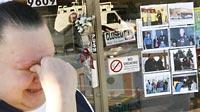Slain deputy had become White Center's "Superman"

Giving up a successful career in law is an unusual route to becoming a beat cop.
But King County Sheriff's Deputy Steve Cox was an unusually idealistic man, say those who knew him. Frustrated with criminals beating the legal system, he left his job as a deputy prosecutor to patrol the streets in White Center, the high-crime neighborhood near where he grew up.
To business owners and residents, he became a "Superman" who was single-handedly making the streets safer and the neighborhood better. He became so deeply involved in community issues that he was elected president of the local council. To his family, he was a man who had found new joy since he and his wife, Maria, adopted a baby, Bronson, who turned 1 in October.
Now the neighborhood is mourning after Cox, 46, was shot and killed early Saturday.
At 1:42 a.m., Cox was called to a White Center house party following reports of gunshots. He was the lone deputy interviewing partygoers one-by-one in a bedroom when a man drew a gun. Cox was shot once in the head. Hearing shots, two other deputies ran toward the room and a firefight ensued. The shooter, identified by law-enforcement sources as Raymond O. Porter, 23, was killed.
Cox later died at Harborview Medical Center.
"He was just a helluva guy ... He was so well respected over there in the White Center community it's just hard to believe," said his father, Ron Cox. "I'm so angry with the guy who killed him. It was so unnecessary."
Tearful friends and colleagues brought bouquets of flowers and notes to a makeshift memorial at the White Center Sheriff & Community Service Center in the hours after his death. King County deputies plan to hold a round-the-clock vigil there until Cox's funeral.
Cox grew up in the Shorewood neighborhood southwest of White Center. His parents were both teachers at nearby schools. Tall and athletic, Cox played basketball at Evergreen High School. He graduated with a bachelor's degree from Central Washington University, then with a law degree from Willamette University in Salem, Ore.
By the mid-1990s, Cox was working as a deputy prosecutor on high-profile murder and gang cases in Pasco. Although always intense and serious, Cox also had a soft side, which came out in the way he cared for the small dogs he raised, said Franklin County Prosecutor Steve Lowe.
Lowe said Cox sat down with him several times to talk about his misgivings about the legal system.
"It's not a perfect system, and sometimes we lose cases because of technicalities. That really, really bothered him," Lowe said. "He made it clear that his goal in life was to go back and be a patrol officer. He was frustrated with what is frankly an imperfect system, and he wanted to always help people and make the community safer. He felt he could do that better back in law enforcement."
After a brief stint working as a prosecutor back in King County, Cox joined the Sheriff's Office nine years ago. Soon after, he married Maria, a bodybuilder, whom he met in a gym. Cox was a fitness buff himself and worked out regularly.
Just over three years ago he was assigned to White Center — the place he had repeatedly told friends and colleagues he wanted to serve and where he thought he could make the biggest impact.
"He wanted to be on the front lines fighting crime," said his brother, also named Ron Cox. "He was an athlete, a fierce competitor and everything he did, he gave 110 percent."
Local bartender Cheryl Moss said Cox did more than anyone else to clean up drug dealing and prostitution: "He was our Superman. And now our Superman's dead."
Last year, Cox's work in White Center was recognized when he won a Community Builder Award from the Seattle Neighborhood Group. As well as his police work, Cox also spoke in local schools, helped organize community festivals and maintained several rental properties in the area.
"You'd see him driving around in his beat-up pickup truck with his dog and plywood hanging out the back," said childhood friend Tony Benavides. "Everyone here knows Steve. I can't even believe it that he's gone. It's surreal."
In his role as president of the North Highline Unincorporated Area Council, Cox would talk to a wide range of people to gauge their views. He became a fierce supporter of the neighborhood being annexed into the city of Burien rather than the city of Seattle, said council treasurer Barbara Peters.
"He thought this best for the community. He wanted it to stay a small community and Seattle is very, very large," she said. "The majority of people, especially the older people, want a small community and easy access to the government."
Cox and his wife adopted Bronson from Guatemala. They had planned to adopt a second child next year.
"When that little boy came along, it lit up his whole world," Peters said. "He was just a great father."
Community leaders and family friends are considering options for a memorial service. One problem may be finding a site big enough to hold it.
Seattle Times staff reporters Jonathan Martin, Jennifer Sullivan and Cara Solomon, and Seattle Times researcher David Turim contributed to this report.
Nick Perry:206-515-5639 or nperry@seattletimes.com
